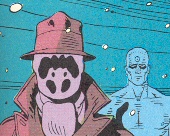“Pain or damage don’t end the world. Or despair or f***ing beatings. The world ends when you’re dead. Until then, you got more punishment in store. Stand it like a man…and give some back.” Alas, the misbegotten hoopleheads at HBO have contrived to dole us out more disappointment: According to Ian McShane, the two promised Deadwood wrap-up movies are not going to happen. “I just got a call on Friday from…a dear friend of mine, who told me that they’re packing up the ranch. They’re dismantling the ranch and taking the stuff out. That ship is gonna sail. Bonsoir, Deadwood.”
Category: Television
From Who to Haddock | The Doctor is In | Creel to Reel | Heroes Fall.
Steven Spielberg and Peter Jackson’s previously-announced Tintin trilogy finds a writer in Doctor Who scribe Steven Moffat, of the Season 3 episode “Blink.” Speaking of which, I’ve run hot and cold on BBC’s Doctor Who update thus far, and have found showrunner Russell Davies’ campy contributions to be mixed at best. But the second half of Season 3 has been exceptionally good Who. From “Blink” to the “Doctor goes Human” two-parter in pre-WWI England (“Human Nature/”The Family of Blood“) to Derek Jacobi’s turn as a lonely, befuddled scientist at the end of time in “Utopia” to the Master taking Tony Blair’s job in “The Sound of Drums,” I’d say this most-recent run can hold its own with the best of the Pertwee-Baker years. (I haven’t seen “Last of the Time Lords,” the Season 3 finale, yet, but I dig John Simm as the Master, and his evil companion is a real kick.)
Off-topic, but also on the television front, I’ve recently boarded the 5:23 Mad Men commuter train. It’s a show I’ve been shying away from despite the good reviews, mainly because I feared it’d be 85% Rat Pack kitsch, i.e. its raison d’etre would be primarily to wallow in the unregenerate un-PCness of the early Sixties. But, while I’m still living a few episodes behind present-time, Mad Men makes for pretty solid television, even if, as with Miller’s Crossing, it can be hard to watch without a glass of Jamesons and clinking ice in hand. Jon Hamm’s Don Draper and John Slattery’s Roger Sterling are particularly good, and, as someone noted on The House Next Door, Michael Gladis’ Paul Kinsey is an eerie facsimile of the young Orson Welles. Plus, with all due respect to Officers Bunk and McNulty, it’s a nice change of pace to watch smart, well-written characters in a TV drama that aren’t cops, doctors, or mobsters.
Finally, I never much cottoned to it anyway, but after the Season 2 premiere, NBC’s Heroes is getting kicked off the DVR. As I said last Spring, the blatant, unattributed ripping off of Watchmen and the X-Men’s “Days of Future Past” in Season 1 was already hard to swallow. And, judging from the first week’s installment, Kring & co. have decided to go back to the well, and have stolen the Comedian storyline straight out of Watchmen too. Given that their poorly-written, overstuffed show is usually as artless as their theft here, count me out.
All in the Game.
“In a way, it doesn’t make sense to talk of ‘The Wire‘ as the best American television show because it’s not very American. The characters in American popular culture are rarely shown to be subject to forces completely beyond their control. American culture is fundamentally Romantic, individualistic and Christian; when it’s not exhorting you to ‘follow your dream’ it’s reassuring us that in the eleventh hour, we will be saved. American culture is a perpetual pep talk, trafficking in tales of personal redemption and the ultimate triumph of good over evil. We don’t do doom. ‘The Wire’ is not Romantic but classical; what matters most in its universe is fulfilling your duty and facing the inexorable with dignity.” From the bookmarks, Salon‘s Laura Miller extols the classical virtues of The Wire. What she said.
Slow Train Coming | How the West was Won (and where it got us).
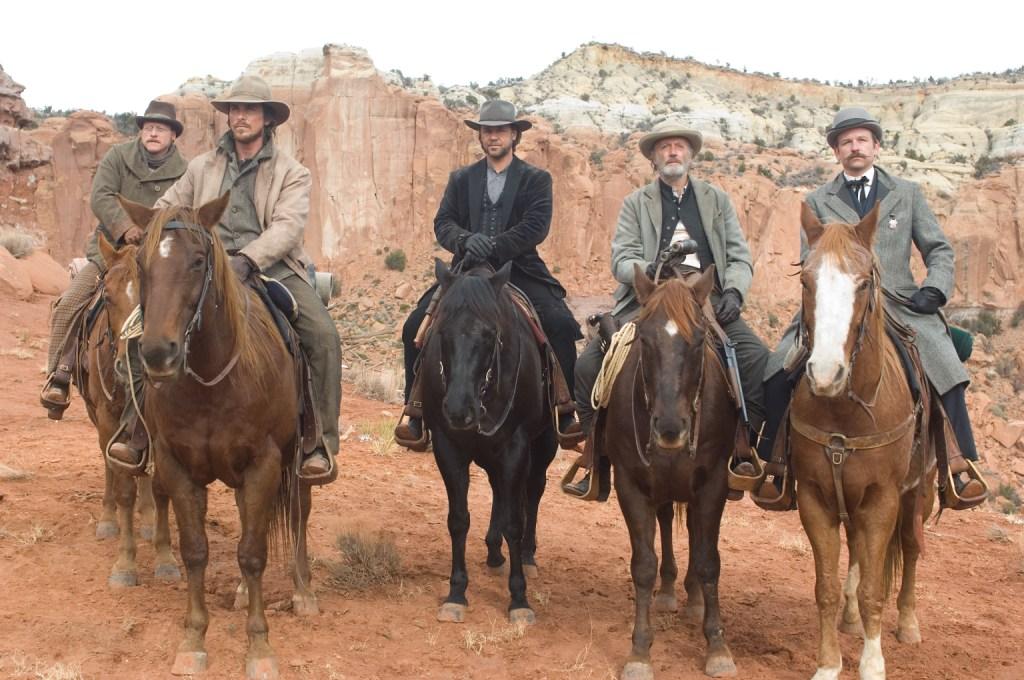
Although the last act strains credulity quite a bit, James Mangold’s moody, memorable 3:10 to Yuma is nonetheless a worthy foray into the unforgiving territory of the Old West. I’ve never been much for oaters, to be honest, but if they keep making ’em like David Milch’s Deadwood and 3:10 (and, hopefully, The Assassination of Jesse James by the Coward Robert Ford in two weeks), I’m all for a full-fledged return of the cowboy pic. Then again, I guess it’d probably have been hard for 3:10 to falter in any event, with talented actors like Christian Bale, Russell Crowe, and others in the respective saddles. Mangold (showing more skill here than he did in Walk the Line) displays an authoritative sense of the genre here, and he doesn’t stint on the fireworks. But, for all the breathtaking “Big Sky Country” vistas and well-executed gunplay on display, the most exciting parts of 3:10 occur in the quiet moments between its two stars, as we watch Crowe (the Black Hat) attempt to wend and worm his way into what remains of (White Hat) Bale’s haunted psyche. With their dark interplay driving 3:10, not even the high suspension of disbelief required by the end, nor an overwrought father-son subplot, manage to derail this train. Come on aboard.
On the outskirts of Bisbee, in the years after the Civil War, an honest life is hard, as attested by the sad fate of one Dan Evans (Bale). Having lost his leg in the service of Abe Lincoln, Evans transplanted his wife (Gretchen Mol, dusty yet luminous) and two sons to the Arizona plains in search of renewal, only to find himself deeply in debt and on the verge of starvation. Dan’s boys, particularly his older son William (Logan Lerman), are humiliated by his failure and seeming weakness…and the rains just ain’t comin’. Meanwhile, the regal, courtly Ben Wade (Crowe), a part-time illustrator and full-time desperado, is living high on the hog, along with his gang of thieves, murderers, and bad, bad men — most notably his adoring #2 Charlie Prince (a.k.a. Ben Foster of Six Feet Under and Freaks & Geeks, strangely eerie and excellent here.) But, after a stagecoach job near Evans’ land, this Jack of Hearts lingers too long back in Bisbee, and is summarily captured by a mishmash of local law enforcement, bounty hunters on the Pinkerton payroll (i.e. a solid Peter Fonda, looking haggard and reminiscent of his dad), and Evans himself, in town to settle a debt one way or another. And, when the local railroad suit (Dallas Roberts) offers a $200 fee that might turn around his struggling fortunes, Evans enlists in the company assembled to take Ben Wade to Yuma Prison, by way of the 3:10 train in Contention. But — and it’s a big but — Wade’s gang is still at large, the forces of Law & Order are amateurish at best (note Firefly‘s Alan Tudyk as a well-meaning veterinarian conscripted into the group) and easily corruptible at worst, and Wade himself is no slouch in the survivability department. By means fair or foul, whether by quoting Scripture with a serpent’s tongue, bashing in a sleeping man’s head with a rock, or tempting Evans (and his son) with all the lucre and pleasurable squalor the ignoble life affords. Ben Wade will do what he must to restore his freedom…
…Or will he? My biggest problem with 3:10 to Yuma, and perhaps it’s also an issue in the Glenn Ford version of 1957 (I haven’t seen it), is that Ben Wade’s motivations grow increasingly confused as the film progresses. Given how easily he subdues certain people at certain times, one begins to wonder what’s keeping Crowe along for this ride, other than a general sense of bemusement about the whole proceedings. By the third act, which devolves into a town-wide shootout at the railroad crossing of Contention, it’s hard to figure exactly why Wade is behaving as he does (or, for that matter, why Evans’ missing leg isn’t a problem as he engages in the cowtown equivalent of Ninja Warrior.) Crowe is given a few lines at various points, and the final shot in the movie, to help explain his reasoning…and I guess it makes a certain amount of sense, from a dramatic perspective. But I’m not sure if I bought it, given all that’s come before.
Still, 3:10 to Yuma is another solid and welcome entrant in the burgeoning ranks of the revisionist western. (Indeed, the film reflects more of the New Western History than it does John Wayne country — For example, there’s a sequence involving evil Luke Wilson overseeing a Chinese railroad camp which is really kinda unnecessary, but I for one just liked seeing a Chinese railroad camp included in the proceedings.) And, as with The Wild Bunch, Unforgiven, and several other superlative entries in the genre, 3:10 frontlines the question of what code should — and actually does — govern a man’s actions when he is unconstrained by larger society.
Indeed, if you’ll permit me a digression, that was the beauty of Deadwood, a classic show still unsullied by Milch’s later, more confused attempt to fashion a Gospel of Surfing: Watching the varied, colorful residents of the town attempt to create a tentative order out of anarchic disorder: What rules must we live by if we are to live together? What should we do when the plague breaks out? How and when should the municipal government gather, who should attend, and what roles should it take on (and, for that matter, should there be canned peaches or cinnamon served at the meetings?) And, for the coup de grace, Milch offered a wry commentary on the iron fist within the velvet glove of the existing Gilded Age social order (and the ugly commercial realities that drove much of westward expansion.) When the fledgling entity of Deadwood finally ran up against the established authorities, it was not the government of these United States it faced, but rather the ruthless and mighty arm of unchecked Capital. By the end of Season 3, everyone — even the wily, formidable, and take-no-prisoners saloon proprietor Al Swearingen — was eventually forced to bow and succumb before the whims of the Great (and Monied) Man, George Hearst. (As Al put it, “Leviathan f**king smiles.”)
3:10 to Yuma doesn’t cover exactly the same ground as Deadwood, of course (and it has much less time to ruminate in any case.) But, at its heart, in the churning psychological tension between Crowe’s Wade and Bale’s Evans — as well as the omnipresent lure and power afforded by the almighty dollar therein — 3:10 ponders similar western verities. In the absence of external fetters, what drives a man to do the right thing, even to the point of ignoring his own self-preservation? In a world of complicated loyalties and compromising shades of grey, where the law is irrevocably bound up with the interests of the railroads and a struggling farmer and a smirking murderer can draw disparate conclusions from the same Bible, what, even, is the “right” thing in the first place? As today, different men come to different answers amid the open country of the Wild West. What probably matters most, 3:10 seems to suggest by the end, is that a man has some answer he’s ready to live — and die — by. As the cowboy troubador Alias once put it, “to live outside the law, you must be honest.” So you’d better do or find something to make your short time in Contention count…’cause no matter how you live your life, that slow train is coming up around the bend, and it ultimately waits for no one.
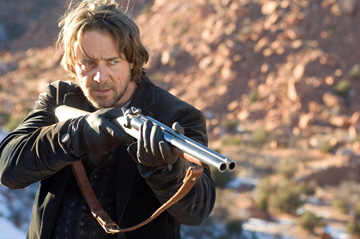
Bal’more farewell | Plug in!
“At 4:40 a.m., the assistant director called out, ‘It’s a wrap, it’s a wrap. We’re done. Forever.'” As birddogged by Listen Missy, David Simon & co. have wrapped shooting on the final season of The Wire (and NY Magazine parses the news for hints of what’s to come.) Do I need to say it again? If you don’t watch The Wire, you really, really, really should…from the beginning. I don’t know a single person who has watched the show and not become resolutely evangelical about it. Season 5 doesn’t air until January, so that’s plenty of Netflix time (1, 2, 3, 4) between now and then: “From the beginning when the show debuted in 2002, [Simon] saw it as a visual novel, with each season a distinct chapter exploring an aspect of inner-city life: The first season examined the drug trade; the second focused on Baltimore’s longshoremen; the third grappled with politics and the notion of reform; the fourth dug into education and the lives of the city’s children. This season, which begins airing Jan. 6, explores the media, featuring a morally challenged reporter played by Tom McCarthy, who wrote and directed the indie film ‘The Station Agent.‘”
Straight Outta Wellington.
Bret? Present. Jemaine? Present. Murray? Present. Good…Everyone’s present and accounted for as HBO renews Flight of the Conchords for a second season (along with more Entourage.) Due to Deadwood, I tried valiantly, but I could never grok David Milch’s puzzling and pretentious John from Cincinnati all that much. And, so far, the much-praised Mad Men and Damages are just filling up DVR space — I haven’t broken into them yet. But, I do love me some Flight of the Conchords these days, and am glad to see Bret and Jemaine getting more run. It’s Business Time.
McNulty, Bunk, Freamon…Heaton.
It played its part against the Barksdale operation in Baltimore. Now it seems an undercover wire may have helped bring down GOP rep and Abramoff flunky Bob Ney. “‘Heaton’s substantial assistance in the investigation and prosecution of Ney was critical to Ney’s decision to admit his involvement in the corrupt relationship with Abramoff,’ Butler wrote. ‘The tapes made by Heaton captured important circumstantial evidence that statements Ney had made to others about matters material to the investigation were false or intentionally misleading.’“
The Rite of Springfield.
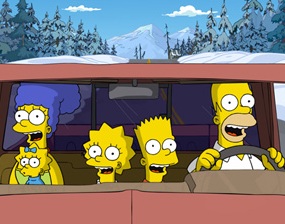 I’m not about to give away the splendid opening sequence of The Simpsons Movie, suffice to say it includes a hilarious JFK homage and culminates with Homer (Dan Castellaneta) declaring something to the effect of “Why would anyone want to pay for a movie you can see for free on TV? Everyone in this theatre is a sucker!” Well, true, but this is The Simpsons, after all. And while this movie basically just plays out like a longer episode of the long-running, award-winning, much-beloved TV show, there are much worse ways to spend eleven bucks and 90 minutes of your time than an extended visit to Springfield. I caught this movie at a Friday afternoon matinee, and it basically felt like watching TV in a very big living room, with lots and lots of friends over, all enjoying themselves to the fullest. So, if you have any fondness at all for the Simpsons clan (and I presume that includes most of America, if not the western world), definitely check out the flick — You know what you’re getting, sure, but the getting is good from opening logo to closing credits. (And if you’re of the mind that the show has lost a step in recent seasons, have no fear — this is the primo, vintage stuff.)
I’m not about to give away the splendid opening sequence of The Simpsons Movie, suffice to say it includes a hilarious JFK homage and culminates with Homer (Dan Castellaneta) declaring something to the effect of “Why would anyone want to pay for a movie you can see for free on TV? Everyone in this theatre is a sucker!” Well, true, but this is The Simpsons, after all. And while this movie basically just plays out like a longer episode of the long-running, award-winning, much-beloved TV show, there are much worse ways to spend eleven bucks and 90 minutes of your time than an extended visit to Springfield. I caught this movie at a Friday afternoon matinee, and it basically felt like watching TV in a very big living room, with lots and lots of friends over, all enjoying themselves to the fullest. So, if you have any fondness at all for the Simpsons clan (and I presume that includes most of America, if not the western world), definitely check out the flick — You know what you’re getting, sure, but the getting is good from opening logo to closing credits. (And if you’re of the mind that the show has lost a step in recent seasons, have no fear — this is the primo, vintage stuff.)
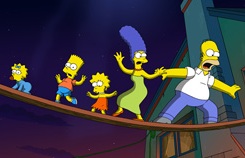 At the start of The Simpsons, life continues in Springfield much as it has this past age — Homer is still an amiable oaf; Marge a long-suffering homemaker; Bart an anarchic terror; Lisa, an earnest intellectual; Maggie a silent enigma. But developments soon arise which threaten to shake the very foundations of this small-town American idyll: Grandpa Abe Simpson experiences what might have been a religious epiphany during Rev. Lovejoy’s Sunday service, Lisa realizes the nearby lake is lurching toward ecological catastrophe, Bart takes a second look at neighbor Ned Flanders as father material, and Homer adopts a pig. And, just as Lisa tries to warn the (rather disinterested) town — in her presentation, “An Irritating Truth” — about the dangers of overpolluting the local loch, Homer, in the throes of donut addiction, disposes of his new pet’s droppings in said lake, precipitating a Malcolm Gladwell-ish tipping point that immediately turns the waters black and causes the EPA (yes, this is the first movie since Ghostbusters where the EPA are the villains) to seal off the town in a large, unbreakable, transparent dome. As you might imagine, the town doesn’t take too kindly to their new total and utter isolation, and when a trail of (rather obvious) clues lead back to the culprit…well, let’s just say “D’oh!”
At the start of The Simpsons, life continues in Springfield much as it has this past age — Homer is still an amiable oaf; Marge a long-suffering homemaker; Bart an anarchic terror; Lisa, an earnest intellectual; Maggie a silent enigma. But developments soon arise which threaten to shake the very foundations of this small-town American idyll: Grandpa Abe Simpson experiences what might have been a religious epiphany during Rev. Lovejoy’s Sunday service, Lisa realizes the nearby lake is lurching toward ecological catastrophe, Bart takes a second look at neighbor Ned Flanders as father material, and Homer adopts a pig. And, just as Lisa tries to warn the (rather disinterested) town — in her presentation, “An Irritating Truth” — about the dangers of overpolluting the local loch, Homer, in the throes of donut addiction, disposes of his new pet’s droppings in said lake, precipitating a Malcolm Gladwell-ish tipping point that immediately turns the waters black and causes the EPA (yes, this is the first movie since Ghostbusters where the EPA are the villains) to seal off the town in a large, unbreakable, transparent dome. As you might imagine, the town doesn’t take too kindly to their new total and utter isolation, and when a trail of (rather obvious) clues lead back to the culprit…well, let’s just say “D’oh!”
 There’s more to the story from there, including definitive proof that this Springfield isn’t in Alaska. (In fact, it borders Ohio, Nevada, Maine, and Kentucky.) But all of it is in general keeping with what you’ve come to expect from the television show: jokes, witticisms, and sight gags delivered at rat-a-tat speed in sly, warm-hearted and/or vaguely misanthropic fashion. (My favorites include the aforementioned opener, a sight gag involving Moe’s bar and the Springfield church, “You’re the five people I’ll meet in Hell!”, Santa’s Little Helper’s subtitles, and most anything involving Kent Brockman, Hans Moleman, Capt. McAllister, Comic Book Guy, or Professor Frink.)
There’s more to the story from there, including definitive proof that this Springfield isn’t in Alaska. (In fact, it borders Ohio, Nevada, Maine, and Kentucky.) But all of it is in general keeping with what you’ve come to expect from the television show: jokes, witticisms, and sight gags delivered at rat-a-tat speed in sly, warm-hearted and/or vaguely misanthropic fashion. (My favorites include the aforementioned opener, a sight gag involving Moe’s bar and the Springfield church, “You’re the five people I’ll meet in Hell!”, Santa’s Little Helper’s subtitles, and most anything involving Kent Brockman, Hans Moleman, Capt. McAllister, Comic Book Guy, or Professor Frink.)
The devastatingly funny South Park: Bigger, Longer, Uncut upped the ante for the big screen by really reveling in the no-holds-barred vileness that’s often only alluded to on the show. But, other than a brief bit of full-frontal nudity, Otto with bong in hand, and Marge swearing (frankly, as out of character as it was for Mrs. Weasley in Hallows), The Simpsons Movie mostly just feels like TV writ large (There’s even a FOX commercial at one point.) But, again, to my mind, that’s not a bad thing — If it ain’t broke and all. I do kinda wish that the movie had been less family-centered and held more for Springfield’s large and splendid supporting cast to do. (For one, shouldn’t Mr. Burns have been behind the big plot? Where were Apu, Principal Skinner, and Groundskeeper Willie? And, as I said of the trailer, why isn’t McBain president? Then again, I’m a fanboy like that.) But, I’m guessing the show will be on again this Sunday (and then some) if I need a Simpsons fix, and, as Maggie notes in the credits, there’s always room for a sequel…
There’s too much confusion.
“‘The decision was to end the show at the top of our game,’ said Moore. ‘That choice precludes certain other choices. [Like wrapping up every possible loose end of plot]. We’ll always be able to say we could have done more.'” TV Week offers up the details revealed about BSG season 4 at Comic-Con over the weekend, including who’s returning, who’s being focused on, and when the final Cylon will be named. (The fact that Moore admits there’re now two Cylon-hybrid kids after the bizarre, Dylanesque Season 3 finale, and that one’s just being ignored while the other (Hera) is crucial to the S4 arc, further suggests to me that they really didn’t think through that goofy end-of-season reveal very well.)
Vigilantes and Vulcans.
Also, some casting news that emerged on the eve of Comic-Con: First, the Watchmen cast is now official — yes, it’s finally happening — and it is as rumored (along with Jeffrey Dean Morgan of Grey’s Anatomy — um, ok — as The Comedian.) And, for the trekkies out there, it seems Matthew Quinto, a.k.a. Heroes Big Bad Sylar, has been cast as Starfleet Academy-era Spock for J.J. Abrams’ Trek movie. (Also, strange to discover from this article that Abrams and Greg Grunberg, the mind-reading cop of Heroes, are childhood best friends.) Now, Quinto is a good physical match…a highly logical choice. But Sam Rockwell as James T. Kirk? That’s genius. (Spock pic not official — I found it here.) Update: Another casting note: Tim Blake Nelson joins Louis Leterrier’s Incredible Hulk revamp as Dr. Samuel Sterns (a.k.a. The Leader), further swelling an already ridiculously tricked-out cast for a remake of a movie made less than five years ago. But, hey, gift horses and all that.



